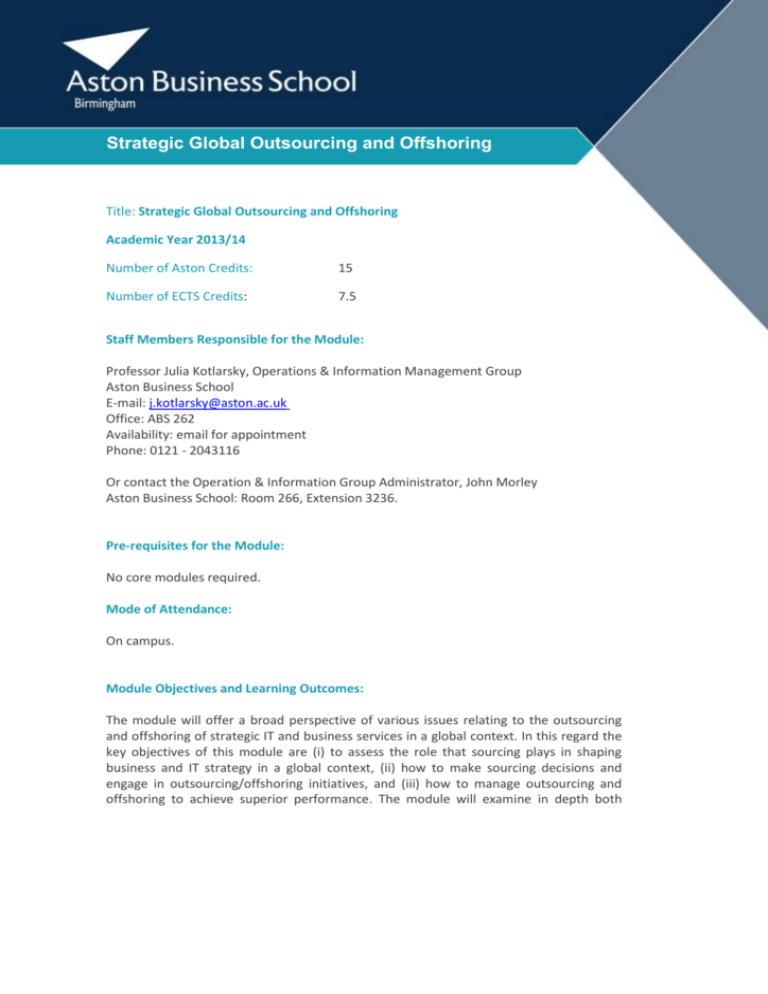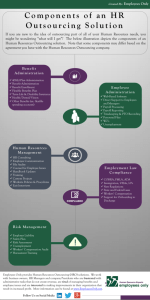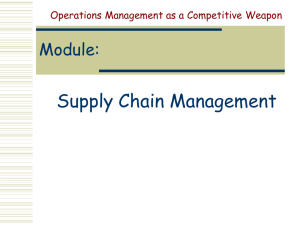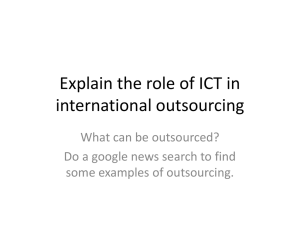Strategic Global Outsourcing and Offshoring
advertisement

Strategic Global Outsourcing and Offshoring Title: Strategic Global Outsourcing and Offshoring Academic Year 2013/14 Number of Aston Credits: 15 Number of ECTS Credits: 7.5 Staff Members Responsible for the Module: Professor Julia Kotlarsky, Operations & Information Management Group Aston Business School E-mail: j.kotlarsky@aston.ac.uk Office: ABS 262 Availability: email for appointment Phone: 0121 - 2043116 Or contact the Operation & Information Group Administrator, John Morley Aston Business School: Room 266, Extension 3236. Pre-requisites for the Module: No core modules required. Mode of Attendance: On campus. Module Objectives and Learning Outcomes: The module will offer a broad perspective of various issues relating to the outsourcing and offshoring of strategic IT and business services in a global context. In this regard the key objectives of this module are (i) to assess the role that sourcing plays in shaping business and IT strategy in a global context, (ii) how to make sourcing decisions and engage in outsourcing/offshoring initiatives, and (iii) how to manage outsourcing and offshoring to achieve superior performance. The module will examine in depth both sides of the equation: client and service provider perspectives, and will discuss the role of intermediaries. From a client viewpoint we will discuss various decisions and strategies relating to outsourcing and offshoring, among them which activities and systems to outsource and which to retain in house? which country to select? how to select a service provider? what capabilities to develop in house to successfully manage the outsourcing relationship? From a service provider viewpoint, we will examine strategies to leverage knowledge from individual relationships (projects) and develop them into organisational capabilities necessary to innovate and move up the value chain. Furthermore, we will focus on the core capabilities that suppliers need to develop and how clients can be made aware of “good” suppliers. We will review and challenge best practices and methodologies in outsourcing of IT and business services using examples from most recent research. Furthermore, we will discuss changes and future trends in the outsourcing marketplace reflecting on (i) recent events and economic trends in wealthy, emerging and developing nations and (ii) threats and benefits for clients and vendors. For example, we will discuss most recent trends such as (i) backsourcing (that is bringing back in-house services previously outsourced to a third party), (ii) how to achieve innovation in outsourcing, and (iii) emerging sourcing models such as crowdsourcing and cloud services. Students will be able to apply may theoretical concepts in practice and develop hands-on experience in outsourcing through engaging in real-life outsourcing project that will be their group assignment for this module. At the end of the module students should be able to make strategic decisions related to outsourcing and offshoring and effectively steer third parties. Learning Outcomes: Upon successful completion of the module students will be able to: (A) Knowledge and Understanding A1 - The theories, principles and underlying concepts and practice of outsourcing and offshoring A2 - How global sourcing affect business and IT strategy in a global context A3 - Strategic, economic, political and social issues associated with global outsourcing and offshoring that surface from client and supplier perspectives. A4 - Key capabilities required by clients and suppliers to achieve successful outsourcing relationships (B) Intellectual Skills B1 – Demonstrate competence in critical reasoning and decision making when analyzing suitability of different sourcing models and strategies that can be adopted by clients and suppliers. B2 - Demonstrate a high level of intellectual and analytical skills when solving problems in the outsourcing and offshoring domains (C) Professional Skills C1 – Be able to identify what areas of the business a client should outsource/ offshore (and what not to). C2 – Demonstrate understanding of the transition and planning issues in IT and Business Process Outsourcing and Offshoring. C3 – Be able to apply key frameworks and methodologies in practice, i.e. decision-making and implementation of outsourcing arrangements in real-life situations. (D)Key/Transferable Skills D1 - Report whiting skills D2 - Presentation skills D3 - Written and verbal communication skills, particularly in different cultural settings D4 – Cross-cultural communications and team working skills D5 – Ability to solve real-life problems under tight deadlines Module Content: 1. 2. 3. 4. Overview of the global sourcing marketplace Sourcing models: what and when to outsource/offshore Country attractiveness for sourcing Client perspective: supplier configuration, vendor selection strategy, and retained management capabilities 5. Supplier perspective: core capabilities and strategies 6. 7. 8. 9. Leveraging knowledge and expertise in global teams The outsourcing lifecycle and the transition phase Governance of outsourcing projects Emerging topics: e.g., innovation in outsourcing Corporate Connections: Each session will incorporate the use of case study examples in the form of full length or mini-cases as well as various multi-media resources. Visiting speakers representing client, vendor or intermediary organizations will contribute to two sessions (about 1.5 hours per guest lecture, planned 2 guest lectures). One of the most important aspects of this module that will enable students to gain practical experience will be a real life outsourcing project that students will undertake in groups (about 4 people in the group). They will be outsourcing a specific task using electronic marketplace such as Freelancer.com (for example). This exercise will enable them to gain hands-on experience on a wide range of topics covered in the class and apply theoretical frameworks in practice. International Dimensions: The context of this module and therefore the content is truly international. The “global” aspects of outsourcing and offshoring will be addresses constantly and from various angles. Contribution of Research: The member of staff teaching the module is an international expert in outsourcing and offshoring. The NIE (Professor Julia Kotlarsky) who will be delivering this module is has extensive experience in the area of global sourcing. She has acted as consultants to IT vendors and government and widely published her work on global sourcing in articles and books, including the Wall Street Journal article on offshoring strategies. Julia is also the co-founder of the Global Sourcing Workshop (www.globalsourcing.org.uk). Ethics, Responsibility & Sustainability: The module will discuss issues related to ethics and responsibility in the context of global sourcing. Method of Teaching: Lectures, case study analysis and discussion, group work (real life outsourcing project), directed reading. Method of Assessment and Feedback: Group work 30% and individual assignment (case study analysis) 70%. Group work includes group assignment, which is based on the real life outsourcing project that the students will undertake (25%) and discussion of case studies and other group exercises (5%) Feedback on the presentations (group assignment) will be given by e-mail before the individual assignment is given out. A summary of the students’ performance overall will be posted on Blackboard after the marks have been approved by the Board of Examiners. Learning Hours: Contact Hours 30 Group Work (to prepare weekly group tasks and assessed group work) and reparation for group presentation 45 Individual Coursework 50 Directed Reading 25 Total 150 The following essential readings is subject to change, in particular is the new edition of the textbook is released. Students should therefore check for the latest version of the textbook prior to buying the core readings. Essential Reading: Oshri, I., Kotlarsky, J. and L.P. Willcocks (2011) “The Handbook of Global Outsourcing and Offshoring”, 2nd edition, Palgrave Macmillan, London. Indicative Bibliography: Kakumanu, P. and Portanova, A. (2006) Outsourcing: Its Benefits, Drawbacks and Other Related Issues, Journal of American Academy of Business 9(2): 1-7. Carmel, E. and Agarwal, R. (2002) The Maturation of Offshore Sourcing of Information Technology Work, MIS Quarterly Executive 1(2): 65-77. Aron R. and J.V. Singh (2005) Getting Offshoring Right, Harvard Business Review, 83(12):135-143 Oshri, I., J. Kotlarsky, L.P. Willcocks. (2007). Managing dispersed expertise in IT offshore outsourcing: Lessons from Tata Consultancy Services. MIS Quarterly Executive 6(2) 53-65. Feeny, D., M. Lacity and L.P. Willcocks (2005). “Taking The Measure of Outsourcing Providers”, Sloan Management Review, 46(3):41-48 Kern, T., Willcocks, L.P., and van Heck, E. "The Winner's Curse in IT Outsourcing: Strategies for Avoiding Relational Trauma," California Management Review (44:2) 2002, pp 47-69. Srikanth, K. and P. Puranam (2011) “Integrating distributed work: comparing task design, communication, and tacit coordination mechanisms” Strategic Management Journal, Vol (32) pp. 849–875 Kotlarsky, J. and Oshri, I. (2008) ‘Country Attractiveness for Offshoring and OffshoreOutsourcing: Additional Considerations’ Journal of Information Technology, 23, 4, pp. 228–31 Krishna, S., Sahay, S. and Walsham, G. (2004) Managing cross-cultural issues in global software outsourcing, Communications of the ACM. 47(4): 62-66. Quinn, J.B. (2000) Outsourcing innovation: the new engine of growth, Sloan Management Review 41(4): 13-28. Rottman, J.W. and Lacity, M.C. (2006). Proven Practices for Effectively Offshoring IT Work. Sloan Management Review, 47(3), pp. 56-63.






